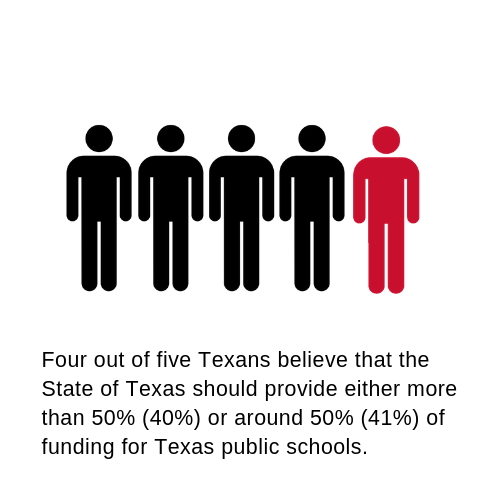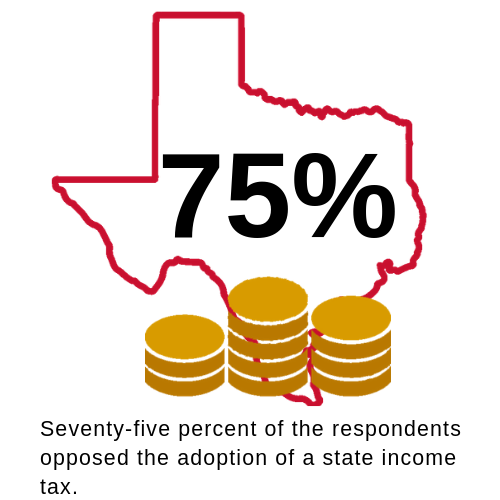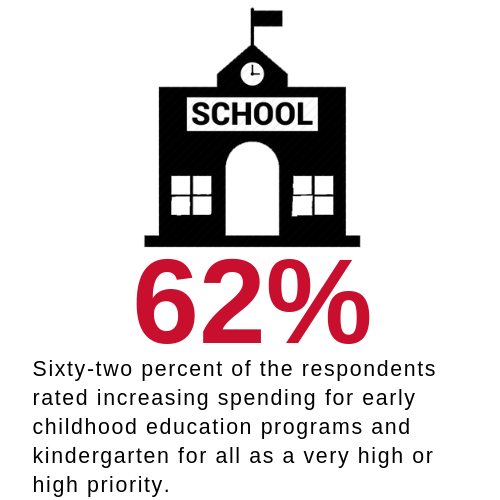





Public school finance and property tax reform emerged as top priority issues for the 2019 Texas legislative session. These topics are the focus of a survey conducted by the University of Houston Hobby School of Public Affairs. The survey found there is strong support for increasing the state’s share of funding for public schools and support for increasing or implementing several targeted taxes to pay for it. A substantial majority of Texans believe property taxes are high and support revenue caps.
The survey was conducted online between March 21 and April 1, 2019 among Texas registered voters. Respondents matched on demographics and characteristics to the population of registered voters of Texas. The number of respondents was 1,000 with a margin of sampling error of +/-3.7%. The margin of error for subgroups will vary.
Read Texas 2019: School Finance, Property Taxes and Spending. This report includes aggregate and subgroup analyses.
Read Texas School Finance and Property Tax Reform Survey. This report provides an aggregate analysis.
Highlights
· Four out of five Texans believe that the State of Texas should provide either more than 50% (40%) or around 50% (41%) of funding for Texas public schools.
· Two-thirds of registered voters in Texas identified raising salaries by $5,000 for classroom teachers and librarians as either a high priority (33%) or a priority (33%).
· Roughly seven in ten Texans believe that funding school safety is a very high (26%) or high (43%) priority.
· Sixty-two percent of respondents rated increasing spending for early childhood education programs and kindergarten for all as a very high or high priority.
· Seventy-six percent of registered voters in Texas oppose the adoption of a state income tax.
· Three-quarters of Texas registered voters (75%) support closing corporate appraisal loopholes.
· Sixty-eight percent of Texans support increasing the tax on cigarettes and other tobacco products, followed by legalizing and taxing casino gambling (62%), legalizing and taxing the sale of recreational marijuana (61%), and increasing the tax on beer, wine and other alcohol (56%).
· More than two-thirds (68%) of Texas registered voters believe property taxes in Texas are very high (31%) or high (37%).
· Seventy-eight percent and 77% support legislation establishing a 2.5% and 5.0% revenue cap respectively.
· While 80% and 71% of Democrats respectively support the legalization and taxation of casino gambling and the recreational sale and use of marijuana, only 55% and 44% of Republicans are in favor of these respective reforms
· A substantial partisan divide exists on reinstating taxes on oil and gas extraction, with over two-thirds (68%) of Democrats and less than half of Republicans (49%) supportive of returning the oil and natural gas severance tax to the higher levels used in the early 1990s.
· Although a majority of all ethnic/racial groups oppose a sales tax increase, African Americans (64%) and Latinos (61%) are significantly more likely than Anglos (52%) to be in opposition. In contrast, no noteworthy differences of opposition exist between Democrats (54%) and Republicans (55%).
· While 74% of African Americans and 72% of Latinos believe additional funding for schools with a high percentage of low income students should be a priority, this position is shared by only 56% of Anglos
· Almost nine out of ten Democrats ranked more funding for low income schools as a priority, only 50% of Republicans did the same.
· Deep partisan differences divide Texans regarding the use of additional funding to support an across-the-board pay raise for school staff: 81% of Democrats compared to 49% of Republicans said this should be a priority.
· African Americans (78%) were significantly more likely than Latinos (66%) who were in turn also significantly more likely than Anglos (58%) to prioritize additional spending to expand early childhood education programs and kindergarten for all. Similar partisan differences exist, with Democrats (84%) twice as likely to prioritize this expansion as Republicans (42%), one of the most substantial sub-group gaps for any spending item.
· African Americans (59%) were the ethnic/racial group most likely to prioritize additional funding for bilingual education, followed by Latinos (54%) and Anglos (37%).
· Profound partisan differences exist on bilingual education, with 63% of Democrats rating the expansion of bilingual education programs as high or very high priority for additional funding compared to only 23% of Republicans, with three-fifths of Republicans (61%) rating it as a low or very low priority.
· Democrats (52%) were significantly more likely to prioritize additional funding being directed to extracurricular activities than were Republicans (28%) by an almost two to one margin.
Texas 2019: School Finance, Property Taxes and Spending (May 2019)
Texas School Finance and Property Tax Reform Survey (April 2019)
TribTalk (May 2019)
Dallas Morning News Op-Ed (May 2019)
Houston Chronicle Op-Ed (April 2019)
Media Release (May 2019)
Media Release (April 2019)
Project Leaders
Pablo Pinto, director, Center for Public Policy and associate professor of public policy
Mark P. Jones, James A. Baker III Institute for Public Policy's fellow in political science, Rice University
Researchers
Leonardo Antenangeli, post-doctoral research fellow
Renée Cross, senior director and researcher
Jim Granato, executive director and professor of public policy
Cong Huang, post-doctoral research fellow
Ulkar Imamverdiyeva, pre-doctoral research fellow
Richard Murray, senior research fellow and professor of political science
Savannah Sipole, post-doctoral research fellow
Agustín Vallejo, post-doctoral research fellow
Isaiah Warner, program manager and researcher
Sunny Wong, professor of public policy